Let’s Go To The Beach!
After five weeks here in Porto, we’re settling into some routines. We walk the dog several times a day. We grocery shop every day, at one of four or five nearby mercados. We study our Portuguese lessons until our heads hurt. And once or twice a week we do an outing to explore another part of the city.
The good part, as we’ve mentioned before, is that when you live in a place you don’t have to rush to see everything. You also have time to visit some of the lesser known sites, the ones that won’t make the top 10 list on TripAdvisor.
On a recent Wednesday morning, we were looking at a map of Porto and asking ourselves, “Where could we go today?” We remembered our recent accidental visit to the Praia Homen do Leme and said, “How about the beach?” (We lived in nearly landlocked Indiana for over 20 years. The opportunity to go to the beach, on a whim, on a weekday, was unimaginable there.)
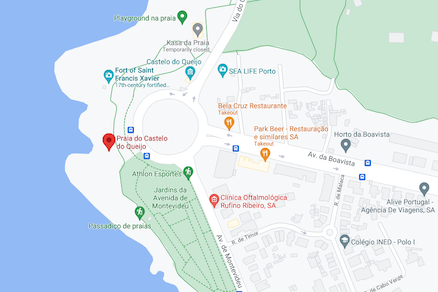
So we were looking at the map, tracing our fingers along the Atlantic coast and we see a beach named Praia do Castel do Queijo that caught our attention.
“What’s that, a castle of cheese? We’ve gotta go there!”
The History of the Castel
The Castel do Queijo, or the castle of cheese, is not a Portuguese version of Chuck E Cheese. It’s a real castle, even if it’s a small one. It’s also known as the Forte de São Francisco Xavier do Queijo. It gets its name from the Queijo rock, or the rock shaped like a cheese, upon which the castle was built.
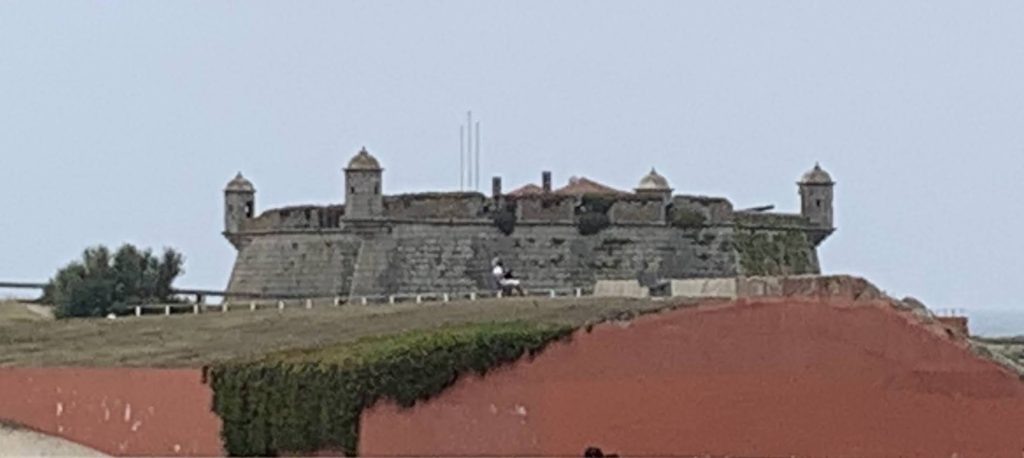
The castle was designed in 1561 but was not built until 100 years later, because the area was determined to have little strategic importance. By the early 19th century it was considered obsolete. But during the Portuguese Civil War (1828-1834), it was occupied by supporters of the upstart King Miguel.
The Castelo was abandoned after the Civil War and looted. In 1978 it was handed over to the Associação de Comandos, an association tied to the Commandos, a Portuguese Special Forces military unit, who maintain the facility and operate a small museum.
What We Saw
From the outside, the castle is a squatty building hugging the curve of the landscape on a piece of land that juts out into the ocean. It has good sight lines in all directions – important for a fort. It sits above a rocky beach. Each corner of the thick stone walls was topped with a guard house.
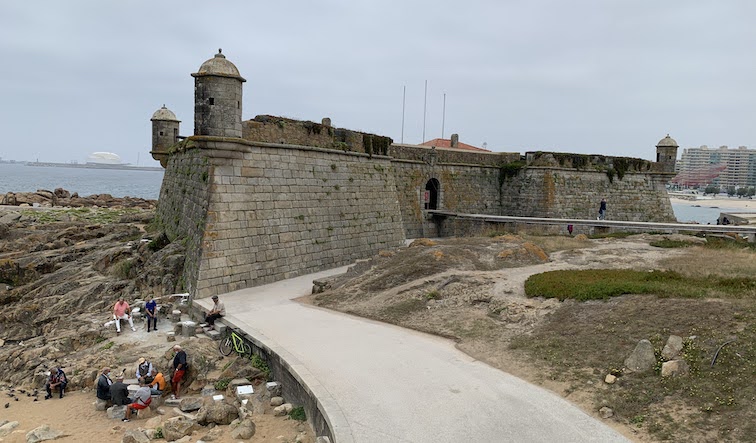
On the morning we visited, there was a group of men sitting alongside the castle on the beach, playing cards. We figured they were either veterans of the Commandos or just the good old boys club that got together to play cards on Wednesday morning.
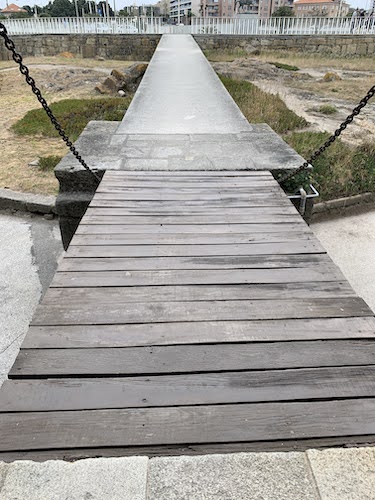
You approach the castle on an elevated walkway that’s five or six feet above the rocky ground and the moat. It’s a wide walkway, but there are no railings. That’s a reminder to us that we’re not in America any longer.
The drawbridge was down, so we went in. Inside the castelo, a member of the Commando Association was selling admission tickets. It costs .50 EUR to get in.
To our right was a set of steep stone steps leading up to the parapet. Again there was no railing. As I went up the steps, a guy was coming down, carrying a stroller. Neither one of us looked very happy about it.
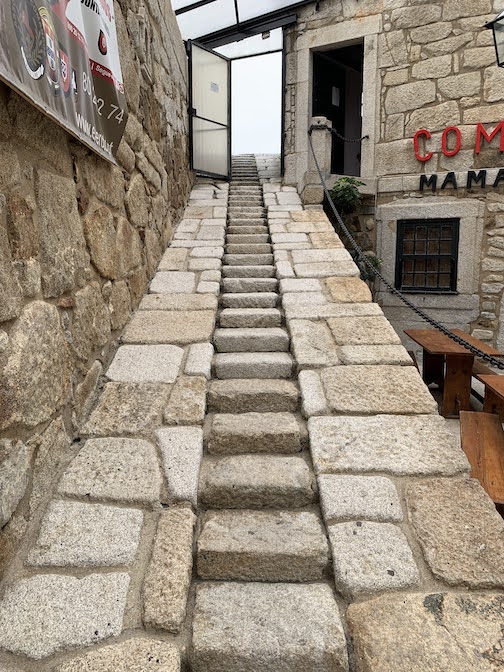
Up on top, the first thing we noticed were the cannons. As we got a closer look at one, Mary’s question was “How did they load these?” We decided they must have rolled them back from the wall and loaded them from the front. Even though they were on wheels, we figured it would have taken a group of stout guys to move one of those cannons.They looked pretty heavy.
We had a nice view of the beach. To the north of the castelo, we could see a large stretch of sandy beach with apartment buildings facing the water. Even on a cool cloudy day there were people on the beach. To the south, the shoreline was very rocky.
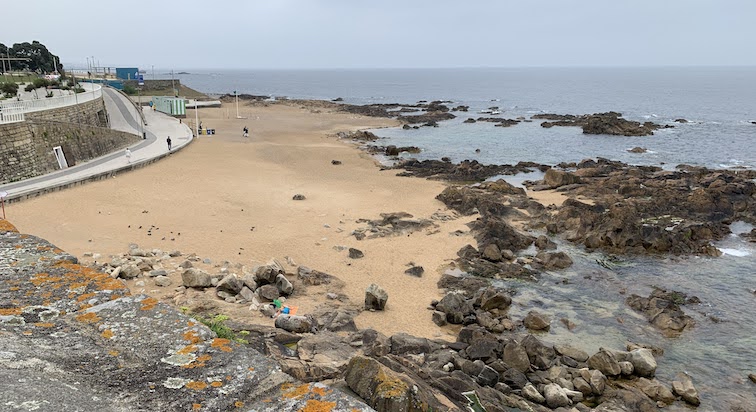
If you look closely at that picture, you’ll see a patch of blue. That was a guy sunbathing, laying between the big rocks. It was about 18 degrees C / 64 degrees F that day and breezy. We were both wearing sweaters. Neither of us could imagine laying out in a bathing suit.
We also saw the crank for raising the drawbridge. We gave it a tug but realized quickly it would also require stouter people than us to actually move it.
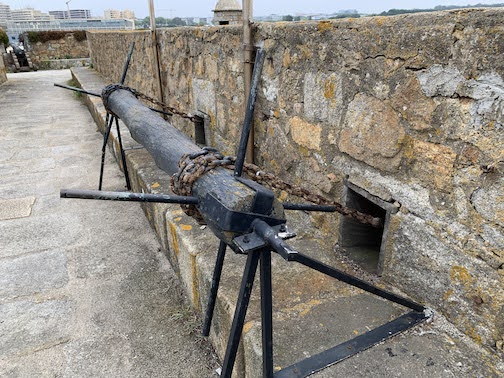
Back downstairs, we took a look at the small military history museum. It was one room filled with mementos, badges, flags, and certificates that reflected the history of the Commandos.
We Finished With Lunch, Of Course
After touring the castelo we took a walk northward along the beach. The walkway was very wide, well-paved and marked in some places to indicate bicycle lanes. In a few places there were vendors out selling souvenirs. There were booths where you could buy ice cream and pastries.
Out on the beach there were a few brave souls. One group was playing beach football. There were several surfing schools, but we only saw one surfer. There was one group of 20-something young men getting an after-surf snack. They were sitting around the table without their wetsuit tops, looking uncomfortable but apparently trying to prove to each other that they were tough enough to do it.
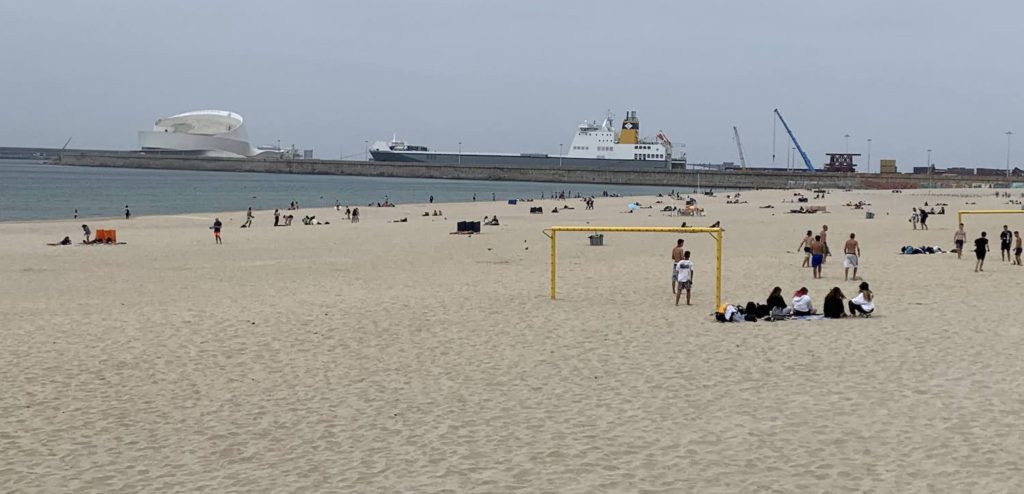
We had lunch at the Picaba Natural Café. It was Mary’s choice and a good one. We sat at an outdoor table, in the sun with a view of the ocean and enjoyed watching people stroll by. Mary had a chicken burger with sweet potatoes and salad. I had a vegetarian wrap with salad. With a glass of wine and a beer, the tab was EUR 20 and change.
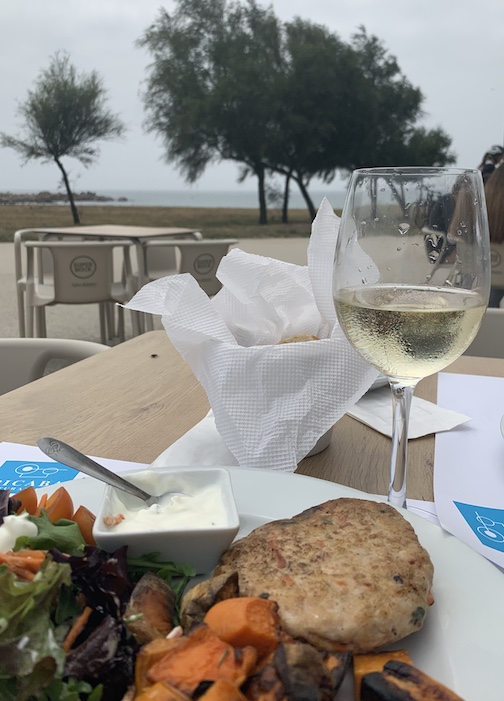
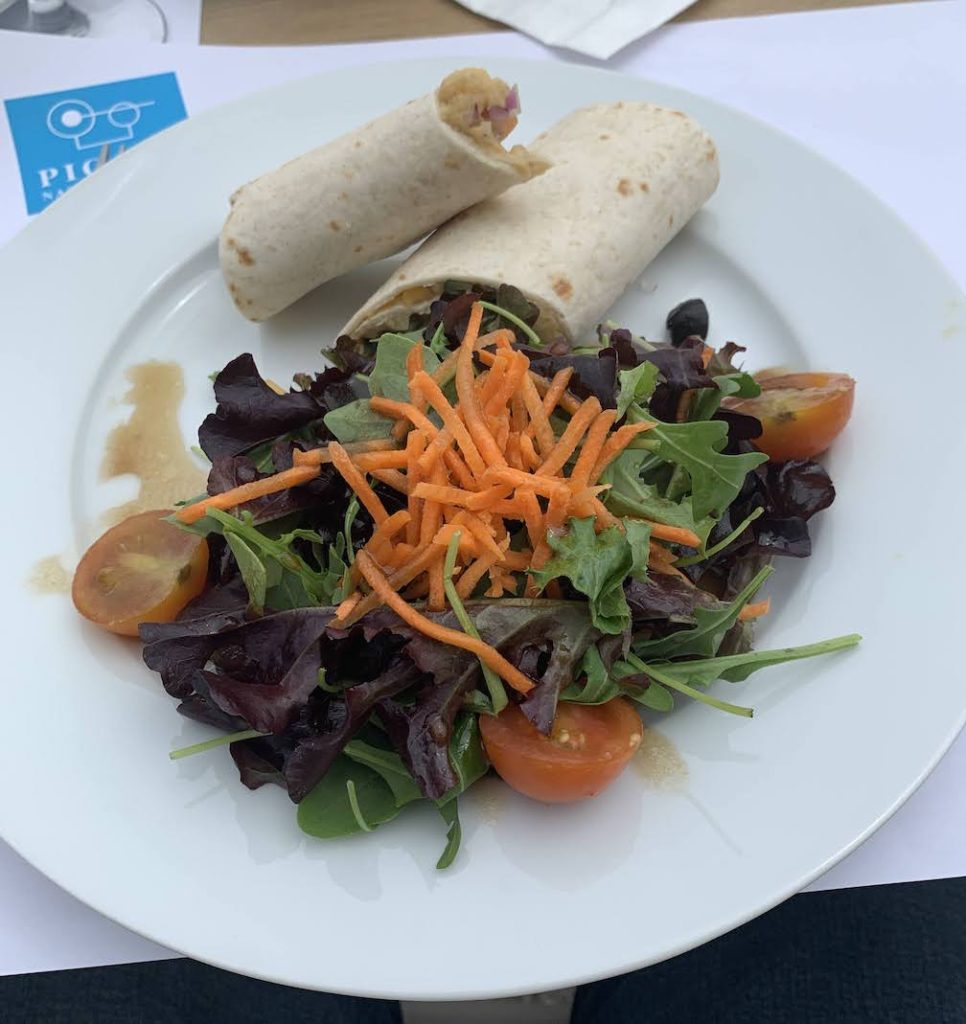
And One More Thing
The last thing we saw as we walked to the bus stop was a seaside sculpture installation that looked like a large fishing net. At the time, we didn’t know what it was.
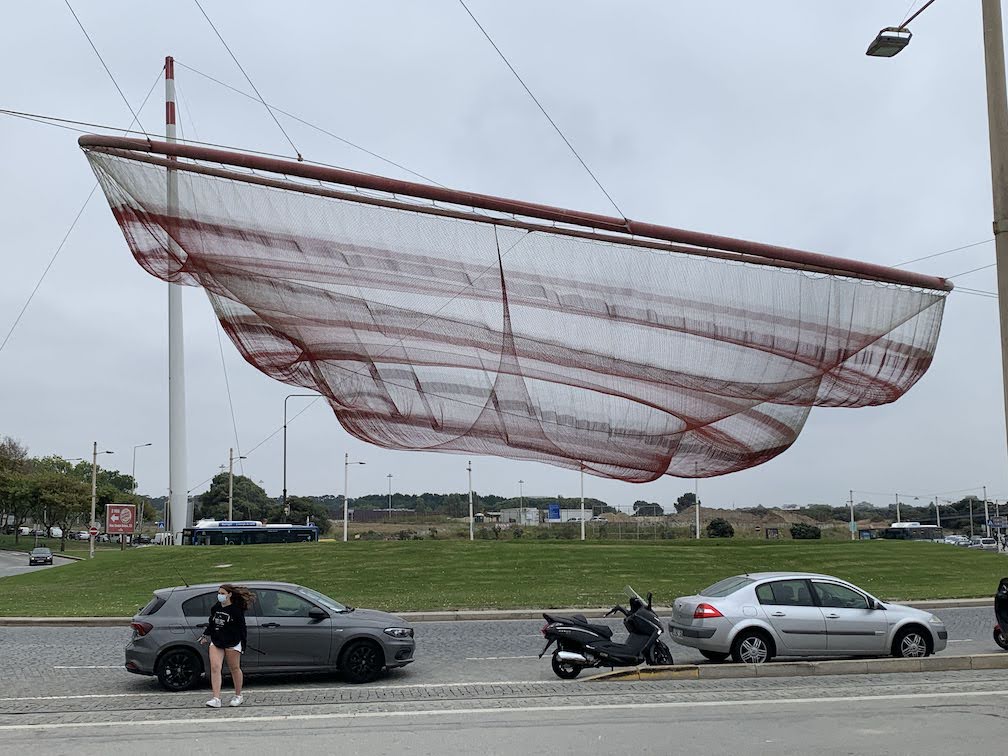
Mike looked it up later and we learned that it was created by Janet Echelman, an American artist, as a tribute to fishermen. Ms. Echelman named the piece She Moves, but the locals have nicknamed it Anémona, the Portuguese word for anemone.
A bit of history, a nice lunch, and some art. What more do you need in a day trip?
What did you see on your last trip to the beach? Leave us a comment below or send one via the Contact Form.
All our best / Todos os nossos melhores,
Mary and Mike
The Cook and The Writer

Update – 8 August 2021: Our friend Nancy Whiteman just published a post about the Anémona on her excellent blog Expat In Portugal. She included a video of a Ted Talk that Janet Echelman made about her experience creating the scupture. You can see Nancy’s post here: She Changes. Check it out!
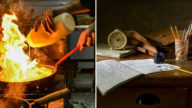
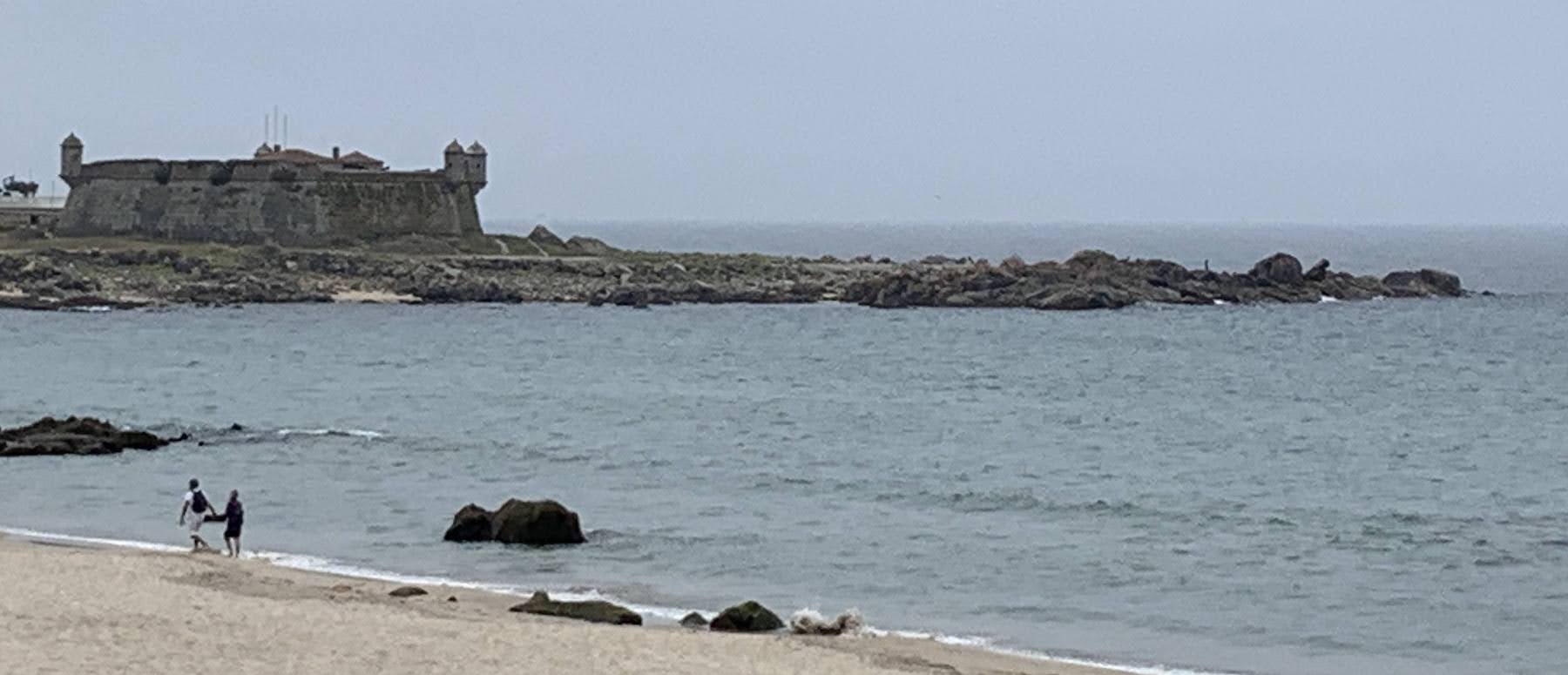
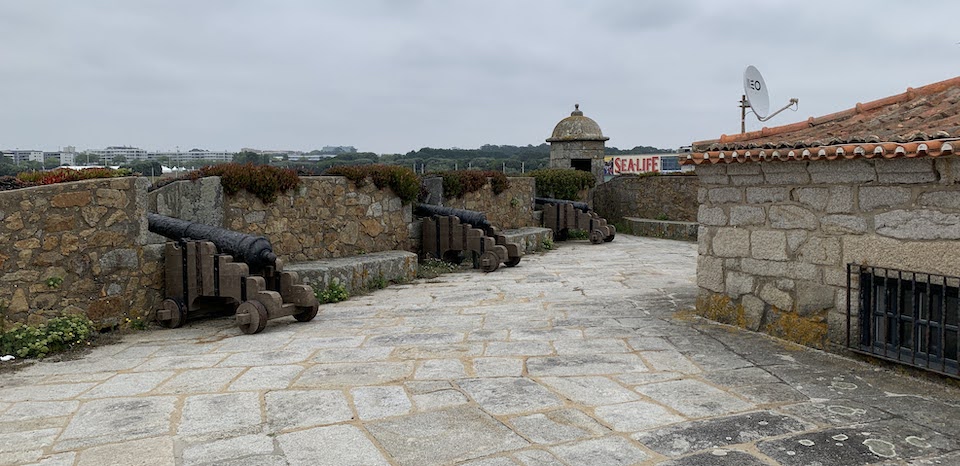
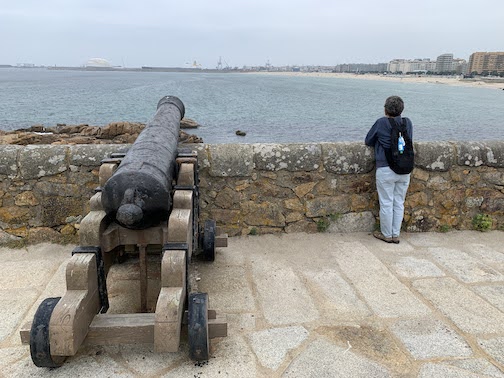

Loved reading your “Day at the Beach” adventure story. Sounds like you two are really enjoying the time to explore each interesting and historical area in Porto. We live 10 mins to our closest beaches in CA and enjoy just driving by to check out the surf or walking the beach when we want a fun day of adventures. Stay safe and carry on to more fun adventures!
Thanks, Sue. We’re going to rent bikes and ride along the beachfront one day soon.
Mike
I love your daily adventures! Hugs to Sox!
Thanks, Bonnie! Sox says “woof!”
What a great day you had. I’ve been lucky enough to live near a wonderful beach at the Jersey shore my whole life. You guys even visited for a week. (Sorry the weather didn’t cooperate). Now we snow bird near a beach in Florida. I hope you enjoy many more adventures at the beach. It’s my favorite place to be. ?️
HiAlice,
It’s pretty amazing that we live near a beach. And we do remember our week at the shore with you, but not the rain. Funny how memory works, isn’t it.
Mike
I have tears in my eyes this morning after reading this, as I imagine what it feels like to be you, in a new country, surrounded by and immersed in a new geography and culture, holding a trifecta of blessings: time, curiosity, and each other.
Adventure on, friends. I’m so happy for you. Thank you for sharing the joy.
Hi Nan,
Thanks for your happy note, despite the tears. We consider ourselves extremely lucky to be here, living this life.
Have a great day!
Mike
Cool, I didn’t know about this castle!
Hi Shay,
There seem to be a lot of interesting things to see along the beach. It looks like you could walk for several miles on wide sidewalks, starting at the mouth of the Douro and going north. That’s an outing for another sunny day.
Mike
Great way to spend a day in Porto. We had an opportunity to see the “fishing net sculpture” during our visit and thought it was amazing. Love your stories….
Thanks, Nancy. We could see the anémona from a distance and were curious about what it was. It was fascinating to see up close.
Mike